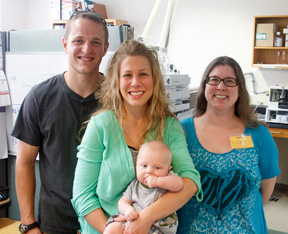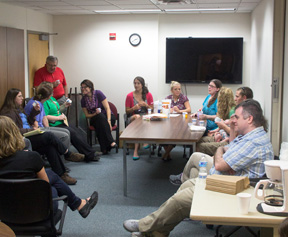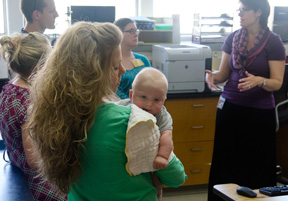About 7:00 AM Monday through Saturday, chemists and support staff working in the Wisconsin State Laboratory of Hygiene (WSLH) Newborn Screening Laboratory gather round a table and open envelopes containing precious samples from the state’s newest residents – dried blood spot specimens collected from babies born within the previous couple of days.
The blood spots are sent to multiple stations in the laboratory where they are tested for 44 rare, serious disorders that, if not treated quickly, can lead to severe health problems and sometimes even death. Out of the 65,000 babies born in Wisconsin annually, about 135 will have one of the disorders.
For lab staff, these blood spots represent real-life babies. But rarely do they get to meet the actual people whose lives they have so profoundly affected.
Earlier this month they got their chance.

David, Kristi and Logan Schrimpf and Joelle Odor in the Wisconsin Newborn Screening Laboratory. Joelle was the first baby to test positive for PKU after newborn screening was consolidated at the WSLH in 1978. Logan is one of the most recent babies to test positive for PKU.
In celebration of Newborn Screening Awareness Month, two people living with PKU – one of the 44 disorders on the newborn screening panel – visited the WSLH Newborn Screening Laboratory.
PKU is a metabolic disorder that requires a lifelong, low-protein, low-phenylalanine diet to avert irreversible brain damage from the accumulation of phenylalanine in the body. People living with PKU drink liquid supplements and/or take pills to obtain needed nutrients for proper growth and development.
Joelle Odor was the first baby to test positive for PKU after newborn screening was consolidated at the WSLH in 1978. She told staff of her challenges staying on the restrictive PKU diet when she reached her teens and how changes in the formulation of supplements have allowed her to get back “on diet”.
Logan Schrimpf is only 3 months old so his parents Kristi and David did the talking for him.
Logan is the Schrimpf’s first baby and his PKU diagnosis has required some additional adjustments for the new parents. David recounted the emotional roller coaster he and Kristi were on the first few weeks of Logan’s life, including how important it was to learn the results of follow-up tests that monitored whether dietary changes were lowering Logan’s phenylalanine levels.
At 3 months, Logan is doing great and the Schrimpf’s are adapting to life with a child who has PKU.
Because diet and supplemental formula are crucial to managing PKU, two dietitians from the University of Wisconsin-Madison’s Waisman Center metabolic disorders clinic also spoke to the lab staff. Nikki Drilias and Therese Breunig brought along samples of some of the different formula options for staff to taste.
Joelle, Kristi, David and Logan also toured the newborn screening lab learning how the chemists detect the disorders in the dried blood spots.
For everyone involved the event was a chance to learn more about the people behind the lab results.

Wisconsin Newborn Screening Laboratory staff sample the different formulas people living with PKU drink daily to supplement their low-protein diet.

Wisconsin Newborn Screening Laboratory Co-Director Dr. Patrice Held (right) explains what happens in the lab to Kristi Schrimpf holding son Logan, Waisman Center dietitian Therese Breunig, David Schrimpf and Joelle Odor.
